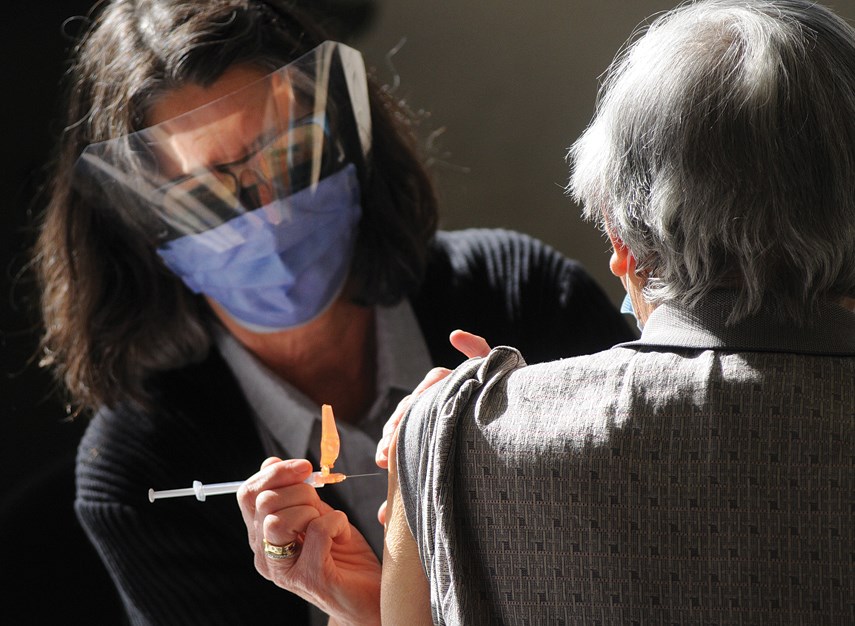Those hoping to drop-in for doses of COVID-19 vaccine in West Vancouver will now have to get their jabs at the North Vancouver clinic instead.
The clinic that has been running in the West Vancouver Community Centre since March had its last day on Sunday.
The West Vancouver clinic was closed as the demand for immunizations there has been falling significantly in recent weeks, according to Vancouver Coastal Health.
The North Shore is one of the most vaccinated communities in the province, with vaccination rates for first doses ranging between 82 and 85 per cent in West Vancouver and up to 89 per cent in North Vancouver.
The other North Shore clinic, at the former ICBC testing station on Lloyd Avenue, will remain open to both appointments and walk-ins from all North Shore residents, as will other clinics in the Lower Mainland.
Those who are 7 weeks past the date of their first vaccination date can also drop in to clinics for a second dose or schedule an appointment in North Vancouver or any other clinic in the Lower Mainland.
This week, the North Vancouver clinic is open 9 a.m. to 7 p.m. through Aug. 8. The clinic is also up until 9 p.m. on Aug. 4.
No pop-up clinics scheduled yet for North Shore
So far there are no pop-up clinics scheduled for the North Shore.
Last week, Dr. Bonnie Henry announced the province is shifting to a focus on walk-in and pop-up clinics, focusing especially on communities and groups of people where rates of vaccination remain low for first doses.
In many cases, that’s because people struggle to find a convenient time to be vaccinated or don’t have access to regular clinics in rural communities, said Henry.
Data released by Henry showed less than five per cent of recent COVID-19 cases in the province in the past month were among fully vaccinated people. About 78 per cent of people hospitalized for COVID-19 were unvaccinated. Among those who had been vaccinated and still ended up in hospital, data shows it was much more common among seniors, who may not mount a strong immune response despite vaccination.
Among the unvaccinated, hospitalized patients were younger, with a median age of 52 and the largest age group between 30 and 39 according to the data.
While 81 per cent of the province’s eligible population over 12 has received one dose of the vaccine, that still leaves about 900,000 people who are not vaccinated, said Dr. Penny Ballem, who is leading the province’s COVID vaccine campaign.
VCH has best vaccination rate in B.C.
Rates of vaccination have varied significantly too. Vancouver Coastal Health has one of the highest vaccination rates, with fewer than 15 per cent of the population unvaccinated. In Northern and Interior Health, those rates are significantly higher – at 32 and 24 per cent.
Younger people – especially teenagers – are also less likely to have been vaccinated.
The province has rejected the idea of either mandatory vaccines or “vaccine passports” for any publicly sanctioned activities.
But Henry stressed there will be consequences for those who remain unvaccinated – including having to undergo frequent COVID tests and don protective equipment in health care settings. Health officials will also shut businesses with outbreaks.
Private businesses and events can also set their own rules about allowing only vaccinated people to attend, she said. “We can absolutely say to come in here you need to be immunized. I’ve had people over to my house but only people who are vaccinated.”
Recently health officials in Interior Health re-instated mandatory mask mandates for indoor public spaces and lowered the interval at which people can get second doses to 28 days after outbreaks in local communities.
Vaccines for children unlikely until later this fall
In Vancouver Coastal Health, Henry has so far only lowered the threshold for receiving second doses to seven weeks, or 49 days, saying a longer interval between vaccine doses offers longer-lasting protection, according to the research.
So far, no vaccines have been approved for children under 12, although clinical trials are currently being conducted. Henry said a vaccine for children is not likely to happen until later in the fall.




